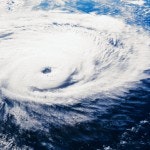October and hurricane season- don’t let your guard down yet

October 2, 2019 By Katie Roundtree
Hurricane season in the Atlantic basin officially runs from June 1st through November 30th. The Eastern United States (including Florida), Central America and the Caribbean islands are in the Atlantic basin, one of 7 basins the world is divided into for tracking storms. The peak period for storm development in the Atlantic basin is from late August through September where most of the storms come off the African coast and across the Atlantic Ocean. These storms give us time to prepare since they have a lot of ocean to cross before they begin to impact our area.
But did you know that at this time of year, when a storm forms, it’s more likely to hit us? That’s because October storms are more likely to form in the western Caribbean Sea, where they tend to travel north over or near western Cuba and then across southern Florida. Part of the challenge with storms that form in the western Caribbean in autumn is that there’s a much shorter lead time, which means not as much time to get the warning out.
According to the National Hurricane Center, 11 major hurricanes [Category 3 or higher] hit Florida in October between 1851 and 2019. There have been six in just the past four years starting with Matthew, followed by Irma and Maria in 2017, Michael in 2018, and Dorian and Lorenzo this year. That’s second only to the month of September, with 19 major hurricane landfalls in Florida over that same time period. August ranked third, with six; but no major hurricanes struck in November.
While temperatures drop in autumn across most parts of the United States, water in the Atlantic Ocean often remains warm enough to support hurricanes. The two deadliest hurricanes in the Atlantic basin’s history were in October. The Great Hurricane of 1780 was the deadliest hurricane, killing almost 20,000 people in the Caribbean, affecting the same areas that were blasted by Irma and Maria recently. The other was Mitch in 1998. It stalled over Central America and killed nearly 20,000 people. In October and November, water in parts of the Atlantic tends to be at the warmest levels of the year, since ocean cooling lags behind cooling of the air. The ocean heat content or what meteorologists call “available energy” for hurricanes can be quite high in the western Caribbean during October. When the warm ocean water evaporates, it heats the surrounding air, which fuels the growth and intensity of a hurricane.
Hurricane Wilma in October 2005 is famous for being the strongest hurricane ever in the Atlantic basin. It had the lowest barometric pressure reading of any hurricane in the history of the basin. Wilma eventually made landfall in Florida as a Category 3 hurricane.
Hurricane season officially ends Nov. 30, but the risk to South Florida in November tends to drop significantly as cool, dry air from the north hinders the development of tropical depressions, storms, and hurricanes. If a storm does form in November, it’s most likely to do so in the Caribbean. But atmospheric conditions then are more likely to steer these storms into the Atlantic, away from Florida.
Between 1851 and 2015, only two hurricanes have hit Florida in November. On Nov. 4, 1935, the Yankee hurricane, which got its nickname because it came from the north, made landfall just north of Miami Beach as a Category 1 hurricane, with five deaths reported in South Florida. On Nov. 21, 1985, Category 2 Hurricane Kate made landfall at Mexico Beach in the Florida Panhandle, near Panama City Beach. There were five reported deaths in the U.S., four of them in Florida.
More likely, but still relatively rare, are tropical storms and depressions hitting in November. Records show there have been six tropical storms to hit Florida in November between 1851 and 2015. These include Mitch in 1998, Gordon in 1994, Keith in 1988, and three unnamed storms in 1946, 1904, and 1861.
Hurricane forecasters also warn that hurricanes can and do form anywhere at any point during the season — and even outside of the season. Don’t let your guard down, be prepared.
Sources: http://www.sun-sentinel.com/news/weather/hurricane/fl-reg-october-hurricanes-south-florida-caribbean-20171024-story.html#; https://www.accuweather.com/en/weather-news/6-of-the-most-notorious-october-hurricanes-in-the-atlantic/70002896.
